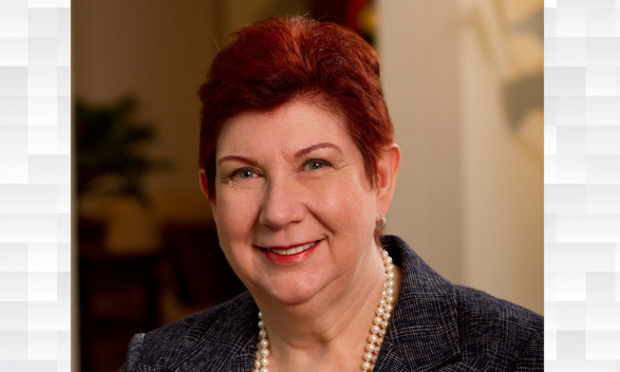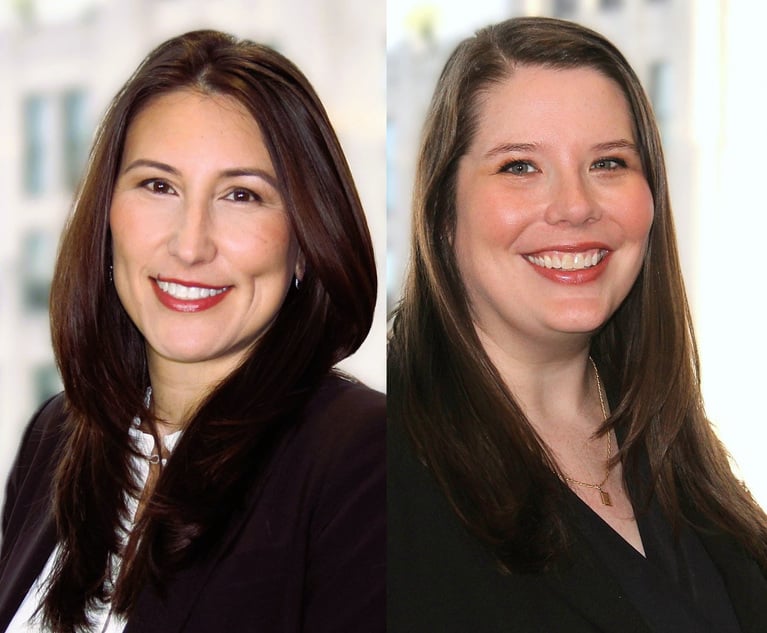Plan for 2018 Like a Rainmaker
Law Inc. columnist Robin Hensley says there are five secrets of success at the top of her New Year's Jump Start Planner for 2018.
January 05, 2018 at 02:51 PM
6 minute read

It's the New Year and, like most Americans, I make resolutions. Perhaps you do, too—go to the gym more, spend quality time with your spouse or maybe make 2018 the year you land that dream client. Unfortunately, in a week or two, reality sets in all too quickly. Resolutions often fall by the wayside.
In my practice coaching attorneys to achieve their business development goals, I've learned secrets to success: Strategy, accountability and focus. When it comes to being a rainmaker, here are five tips from my New Year's Jump Start Planner:
Identify Your Ideal Client
This doesn't mean “a large public company that needs a lawyer.” The devil is in the details. Know the name of the general counsel and where he or she went to law school, or whether one of your current clients or referral sources knows him or her. Find qualified connections.
This is also about building your brand. If you are focused on construction law, how do you reach other construction companies? Find those leaders who make the hiring decisions.
You can't market yourself efficiently if you cannot name your top three ideal clients—in detail. You may recall that, when I recently spoke with Ogletree Deakins' Phillip Russell, he compared networking to spearfishing. In his favorite hobby he dives 90 feet into the Gulf of Mexico to hunt down fish; he doesn't wait for them.
Do Something Special for Your Existing Clients
This is a guarantee: Any client worth having has someone else recruiting him or her. What are you doing to maintain your current clients?
I worked with one lawyer who had not visited her top client in person in several months, despite only being a 20-minute car ride from the office.
Get in front of your clients and build meaningful relationships. It could be a lunch-and-learn CLE for the in-house legal department or a simple lunch to catch up on legal news.
This is also an opportunity for you to cross-sell your firm. Is there another legal matter that one of your colleagues could handle?
No More 'One Night Stands'
This is my term for attending a conference and not getting anything out of it. A lot of busy lawyers commit to a speaking engagement and forget about it until it's on top of them. They spend the final hours leading up to the conference preparing PowerPoints—maybe even while on the plane ride—miss the other sessions and then fly out immediately after their presentation. While the 300 attendees may have “seemed nice” and “looked interested” and we can “hope” they will reach out, it's unlikely that will happen without a clear strategy. Speaking without planning is simply a waste of time.
Before you even begin preparing your presentation—and certainly well before your plane lifts off—get names of the people in the room as well as their positions and companies. Identify two or three attendees to approach before the program. Perhaps enlist their help in guiding the critical issues you plan to cover. Proactively address them and say, “I see you are planning on attending XYZ conference. As I prepare my session breakout on 'Key Challenges for HR Executives in 2018,' I would love the opportunity to get your insight on the topics you feel would be most important to address.”
And if your ideal clients aren't on the attendee list, find out if you can invite them. Maximize your time at the conference by making sure the dream clients hear your presentation and recognize you as a subject knowledge expert.
Set a Designated Time for Marketing
I cannot overstate this point. So many lawyers have grand plans for the New Year and then get derailed because they are busy professionals who always need to send one last email.
Dedicate a time and a place for marketing and don't make it Friday evening after happy hour. Fifteen minutes on Tuesday or Thursday mornings is the perfect amount of time, at a productive hour. Choose a place where you can concentrate. That may mean you find a remote location so that you aren't distracted by email or others trying to get your attention.
One client of mine works on his marketing plan after he goes to the gym. It is just part of his routine at this point.
Block the 15 minutes on your calendar once or twice a week. Longer blocks of time are harder to maintain. If you need to reschedule, do it. Just don't delete the time for marketing. It's important to your practice's future health.
Stay Accountable
It's easier to achieve your goals if you have help. Deputize a trusted colleague to help you meet your goals.
After a lunch meeting with a potential client, recap the details of the meeting with your assistant or add notes to your phone. What are the client's interests? What is her dog's name? Where did she go to college or what does he like to do on the weekend? These key details are personal touches that can make you stand out among others who don't bother to get to know their clients.
It should be second nature to record the information after every meeting—and, so you stay accountable, let your colleague know when you've completed this task.
Since founding Raising the Bar, I have worked with more than 1,000 lawyers in 33 states and, despite vast disparities in practice areas and personality, every successful lawyer has focused on strategy, accountability and focus when starting the next year of planning.
This content has been archived. It is available through our partners, LexisNexis® and Bloomberg Law.
To view this content, please continue to their sites.
Not a Lexis Subscriber?
Subscribe Now
Not a Bloomberg Law Subscriber?
Subscribe Now
NOT FOR REPRINT
© 2025 ALM Global, LLC, All Rights Reserved. Request academic re-use from www.copyright.com. All other uses, submit a request to [email protected]. For more information visit Asset & Logo Licensing.
You Might Like
View All


Trending Stories
- 1Who Is Nicholas J. Ganjei? His Rise to Top Lawyer
- 2Delaware Supreme Court Names Civil Litigator to Serve as New Chief Disciplinary Counsel
- 3Inside Track: Why Relentless Self-Promoters Need Not Apply for GC Posts
- 4Fresh lawsuit hits Oregon city at the heart of Supreme Court ruling on homeless encampments
- 5Ex-Kline & Specter Associate Drops Lawsuit Against the Firm
Who Got The Work
J. Brugh Lower of Gibbons has entered an appearance for industrial equipment supplier Devco Corporation in a pending trademark infringement lawsuit. The suit, accusing the defendant of selling knock-off Graco products, was filed Dec. 18 in New Jersey District Court by Rivkin Radler on behalf of Graco Inc. and Graco Minnesota. The case, assigned to U.S. District Judge Zahid N. Quraishi, is 3:24-cv-11294, Graco Inc. et al v. Devco Corporation.
Who Got The Work
Rebecca Maller-Stein and Kent A. Yalowitz of Arnold & Porter Kaye Scholer have entered their appearances for Hanaco Venture Capital and its executives, Lior Prosor and David Frankel, in a pending securities lawsuit. The action, filed on Dec. 24 in New York Southern District Court by Zell, Aron & Co. on behalf of Goldeneye Advisors, accuses the defendants of negligently and fraudulently managing the plaintiff's $1 million investment. The case, assigned to U.S. District Judge Vernon S. Broderick, is 1:24-cv-09918, Goldeneye Advisors, LLC v. Hanaco Venture Capital, Ltd. et al.
Who Got The Work
Attorneys from A&O Shearman has stepped in as defense counsel for Toronto-Dominion Bank and other defendants in a pending securities class action. The suit, filed Dec. 11 in New York Southern District Court by Bleichmar Fonti & Auld, accuses the defendants of concealing the bank's 'pervasive' deficiencies in regards to its compliance with the Bank Secrecy Act and the quality of its anti-money laundering controls. The case, assigned to U.S. District Judge Arun Subramanian, is 1:24-cv-09445, Gonzalez v. The Toronto-Dominion Bank et al.
Who Got The Work
Crown Castle International, a Pennsylvania company providing shared communications infrastructure, has turned to Luke D. Wolf of Gordon Rees Scully Mansukhani to fend off a pending breach-of-contract lawsuit. The court action, filed Nov. 25 in Michigan Eastern District Court by Hooper Hathaway PC on behalf of The Town Residences LLC, accuses Crown Castle of failing to transfer approximately $30,000 in utility payments from T-Mobile in breach of a roof-top lease and assignment agreement. The case, assigned to U.S. District Judge Susan K. Declercq, is 2:24-cv-13131, The Town Residences LLC v. T-Mobile US, Inc. et al.
Who Got The Work
Wilfred P. Coronato and Daniel M. Schwartz of McCarter & English have stepped in as defense counsel to Electrolux Home Products Inc. in a pending product liability lawsuit. The court action, filed Nov. 26 in New York Eastern District Court by Poulos Lopiccolo PC and Nagel Rice LLP on behalf of David Stern, alleges that the defendant's refrigerators’ drawers and shelving repeatedly break and fall apart within months after purchase. The case, assigned to U.S. District Judge Joan M. Azrack, is 2:24-cv-08204, Stern v. Electrolux Home Products, Inc.
Featured Firms
Law Offices of Gary Martin Hays & Associates, P.C.
(470) 294-1674
Law Offices of Mark E. Salomone
(857) 444-6468
Smith & Hassler
(713) 739-1250






